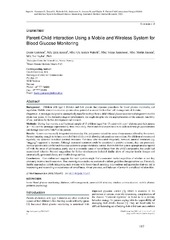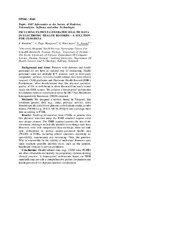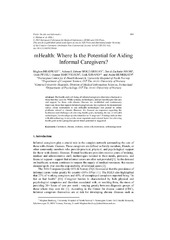Blar i forfatter "Årsand, Eirik"
-
Exploring Real-World mHealth Use for Diabetes Consultations: Pros and Pitfalls of a Pragmatic Mixed-Methods Approach
Bradway, Meghan; Årsand, Eirik (Journal article; Tidsskriftartikkel; Peer reviewed, 2021)Intervention research is often highly controlled and does not reflect real-world situations. More pragmatic approaches, albeit less controllable and more challenging, offer the opportunity of identifying unexpected factors and connections. As the introduction of mHealth into formal diabetes care settings is relatively new and less often explored from the perspectives of patients and providers together, ... -
Factors Engaging Users of Diabetes Social Media Channels on Facebook, Twitter, and Instagram: Observational Study
Gabarron, Elia; Larbi, Dillys; Dorronzoro, Enrique; Hasvold, Per Erlend; Wynn, Rolf; Årsand, Eirik (Journal article; Tidsskriftartikkel; Peer reviewed, 2020-09-29)<p><i>Background:</i> Diabetes patient associations and diabetes-specific patient groups around the world are present on social media. Although active participation and engagement in these diabetes social media groups has been mostly linked to positive effects, very little is known about the content that is shared on these channels or the post features that engage their users the most. <p><i>Objective:</i> ... -
Features of Mobile Diabetes Applications: Review of the Literature and Analysis of Current Applications Compared Against Evidence-Based Guidelines
Chomutare, Taridzo; Fernandez-Luque, Luis; Årsand, Eirik; Hartvigsen, Gunnar (Journal article; Tidsskriftartikkel; Peer reviewed, 2011)Background: Interest in mobile health (mHealth) applications for self-management of diabetes is growing. In July 2009, we found 60 diabetes applications on iTunes for iPhone; by February 2011 the number had increased by more than 400% to 260. Other mobile platforms reflect a similar trend. Despite the growth, research on both the design and the use of diabetes mHealth applications is scarce. ... -
The few touch digital diabetes diary : user-involved design of mobile self-help tools for peoplewith diabetes
Årsand, Eirik (Doctoral thesis; Doktorgradsavhandling, 2009-12-10)Paradoxically, the technological revolution that has created a vast health problem due to a drastic change in lifestyle also holds great potential for individuals to take better care of their own health. The first consequence is not addressed in this dissertation, but the second represents the focus of the work presented, namely utilizing ICT to support self-management of individual health challenges. ... -
Health research requires efficient platforms for data collection from personal devices
Johannessen, Erlend; Henriksen, André; Årsand, Eirik; Horsch, Alexander; Johansson, Jonas; Hartvigsen, Gunnar (Journal article; Tidsskriftartikkel; Peer reviewed, 2023)Data from consumer-based devices for collecting personal health-related data could be useful in diagnostics and treatment. This requires a flexible and scalable software and system architecture to handle the data. This study examines the existing mSpider platform, addresses shortcomings in security and development, and suggests a full risk analysis, a more loosely coupled component- based system for ... -
The House of Carbs: Personalized Carbohydrate Dispenser for People with Diabetes
Randine, Pietro; Micucci, Daniela; Hartvigsen, Gunnar; Årsand, Eirik (Journal article; Tidsskriftartikkel; Peer reviewed, 2020)Patients with diabetes are often worried about having low blood glucose because of the unpleasant feeling and possible dangerous situations this can lead to. This can make patients consume more carbohydrates than necessary. Ad-hoc carbohydrate estimation and dosing by the patients can be unreliable and may produce unwanted periods of high blood glucose. In this paper we present a system that ... -
How mHealth can facilitate collaboration in diabetes care: qualitative analysis of codesign workshops
Bradway, Meghan; Morris, Rebecca L.; Giordanengo, Alain; Årsand, Eirik (Journal article; Tidsskriftartikkel; Peer reviewed, 2020-11-30)<i>Background</i> - Individuals with diabetes are using mobile health (mHealth) to track their self-management. However, individuals can understand even more about their diabetes by sharing these patient-gathered data (PGD) with health professionals. We conducted experience-based co-design (EBCD) workshops, with the aim of gathering end-users’ needs and expectations for a PGD-sharing system.<p> ... -
Improving Diabetes Care for Young People With Type 1 Diabetes Through Visual Learning on Mobile Phones: Mixed-Methods Study
Frøisland, Dag Helge; Årsand, Eirik; Skårderud, Finn (Journal article; Tidsskriftartikkel; Peer reviewed, 2012)Background: Only 17% of Norwegian children and adolescents with diabetes achieve international treatment goals measured by glycated hemoglobin (HbA1c). Classic patient–physician consultations seem to be poorly adapted to young children. New strategies that are better attuned to young people to improve support of adolescents’ self-management of diabetes need to be tested and evaluated. Objective: ... -
Including patient-generated health data in electronic health records – a solution for CGM-data
Randine, Pietro; Pape-Haugaard, Louise; Hartvigsen, Gunnar; Årsand, Eirik (Journal article; Tidsskriftartikkel; Peer reviewed, 2023)Patients with diabetes and health personnel do not have an optimal way of interacting. Health personnel must use multiple ICT systems, such as third-party companies’ services, to access health-related data from diverse vendors’ CGM platforms and Electronic Health Record (EHR). Furthermore, other health-related data like physical activities, quality of life or well-being is often discussed but ... -
Inequalities in the Use of eHealth Between Socioeconomic Groups Among Patients With Type 1 and Type 2 Diabetes: Cross-Sectional Study
Hansen, Anne Helen; Bradway, Meghan; Brož, Jan; Claudi, Tor; Henriksen, Øystein; Wangberg, Silje C; Årsand, Eirik (Journal article; Tidsskriftartikkel; Peer reviewed, 2019-05-29)<p><i>Background - </i>The prevalence of diabetes and the use of electronic health (eHealth) are increasing. People with diabetes need frequent monitoring and follow-up of health parameters, and eHealth services can be highly valuable. However, little is known about the use of eHealth in different socioeconomic groups among people with diabetes. <p><i>Objective - </i>The aim of this study was to ... -
Information and communication technology-based interventions for chronic diseases consultation: Scoping review
Randine, Pietro; Sharma, Aakash; Hartvigsen, Gunnar; Johansen, Håvard D.; Årsand, Eirik (Journal article; Tidsskriftartikkel; Peer reviewed, 2022-04-29)Background: Medical consultations are often critical meetings between patients and health personnel to provide treatment, health-management advice, and exchange of information, especially for people living with chronic diseases. The adoption of patient-operated Information and Communication Technologies (ICTs) allows the patients to actively participate in their consultation and treatment. The ... -
Lifestyle changes among people with type 2 diabetes are associated with participation in online groups and time since diagnosis
Hansen, Anne Helen; Wangberg, Silje C.; Årsand, Eirik (Journal article; Tidsskriftartikkel; Peer reviewed, 2021-07-12)<i>Background</i> - For people with Type 2 diabetes (T2D), lifestyle changes may be the most effective intervention. Online groups for people with diabetes holds a great potential to support such changes. However, little is known about the association between participation in online groups and lifestyle changes based on internet information in people with T2D. The aim of this study was to investigate ... -
Long-Term Engagement With a Mobile Self-Management System for People With Type 2 Diabetes
Tatara, Naoe; Årsand, Eirik; Skrøvseth, Stein Olav; Hartvigsen, Gunnar (Journal article; Tidsskriftartikkel; Peer reviewed, 2013-03-27) -
A Low-Intensity Mobile Health Intervention With and Without Health Counseling for Persons With Type 2 Diabetes, Part 1: Baseline and Short-Term Results From a Randomized Controlled Trial in the Norwegian Part of RENEWING HEALTH
Torbjørnsen, Astrid; Jenum, Anne Karen; Småstuen, Milada Cvancarova; Årsand, Eirik; Holmen, Heidi; Wahl, Astrid Klopstad; Ribu, Lis (Journal article; Tidsskriftartikkel; Peer reviewed, 2014-12-11) -
Measuring the effects of sharing mHealth data during diabetes consultations: a mixed-method study protocol
Bradway, Meghan; Giordanengo, Alain; Joakimsen, Ragnar Martin; Hansen, Anne Helen; Grøttland, Astrid; Hartvigsen, Gunnar; Randine, Pietro; Årsand, Eirik (Journal article; Tidsskriftartikkel; Peer reviewed, 2020-02-10)<i>Background</i>: There is rising demand for health care’s limited resources. Mobile health (mHealth) could be a solution, especially for those with chronic illnesses such as diabetes. mHealth can increases patients’ options to self-manage their health, improving their health knowledge, engagement, and capacity to contribute to their own care decisions. However, there are few solutions for sharing ... -
Methods and Evaluation Criteria for Apps and Digital Interventions for Diabetes Self-Management: Systematic Review
Larbi, Dillys; Randine, Pietro; Årsand, Eirik; Antypas, Konstantinos; Bradway, Meghan; Gabarron, Elia (Journal article; Tidsskriftartikkel; Peer reviewed, 2020-07-06)<i>Background</i>: There is growing evidence that apps and digital interventions have a positive impact on diabetes self-management. Standard self-management for patients with diabetes could therefore be supplemented by apps and digital interventions to increase patients’ skills. Several initiatives, models, and frameworks suggest how health apps and digital interventions could be evaluated, but ... -
Methods and Measures Used to Evaluate Patient-Operated Mobile Health Interventions: Scoping Literature Review
Bradway, Meghan; Gabarron, Elia; Johansen, Monika Alise; Zanaboni, Paolo; Jardim, Patricia; Joakimsen, Ragnar Martin; Pape-Haugaard, Louise; Årsand, Eirik (Journal article; Tidsskriftartikkel; Peer reviewed, 2020-04-30)<i>Background</i>: Despite the prevalence of mobile health (mHealth) technologies and observations of their impacts on patients’ health, there is still no consensus on how best to evaluate these tools for patient self-management of chronic conditions. Researchers currently do not have guidelines on which qualitative or quantitative factors to measure or how to gather these reliable data.<p><p> ... -
mHealth: Where Is the Potential for Aiding Informal Caregivers?
Bradway, Meghan; Woldaregay, Ashenafi Zebene; Issom, David-Zacharie; Pfuhl, Gerit; Hartvigsen, Gunnar; Årsand, Eirik; Henriksen, André (Journal article; Tidsskriftartikkel; Peer reviewed, 2021)The health and well-being of informal caregivers often take a backseat to those that they care for. While systems, technologies, and services that provide care and support for those with chronic illnesses are established and continuously improved, those that support informal caregivers are less explored. An international survey about motivations to use mHealth technologies was posted to online ... -
A Mobile Health Intervention for Self-Management and Lifestyle Change for Persons With Type 2 Diabetes, Part 2: One-Year Results From the Norwegian Randomized Controlled Trial RENEWING HEALTH
Holmen, Heidi; Torbjørnsen, Astrid; Wahl, Astrid Klopstad; Jenum, Anne Karen; Småstuen, Milada Cvancarova; Årsand, Eirik; Ribu, Lis (Journal article; Tidsskriftartikkel; Peer reviewed, 2014) -
Mobile Phone-Based Pattern Recognition and Data Analysis for Patients with Type 1 Diabetes
Skrøvseth, Stein Olav; Årsand, Eirik; Godtliebsen, F.; Hartvigsen, Gunnar (Journal article; Tidsskriftartikkel; Peer reviewed, 2012)Persons with type 1 diabetes who use electronic self-help tools, most commonly blood glucose meters, record a large amount of data about their personal condition. Mobile phones are powerful and ubiquitous computers that have a potential for data analysis, and the purpose of this study is to explore how self-gathered data can help users improve their blood glucose management. Thirty patients with ...


 English
English norsk
norsk


















